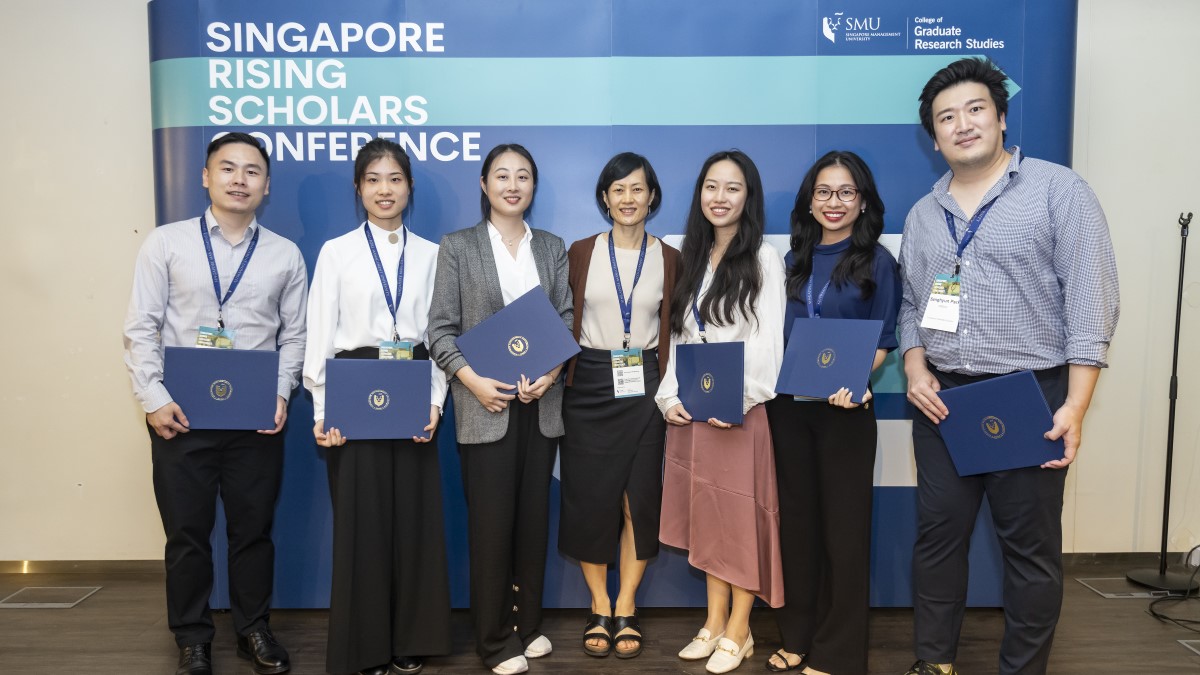
Writing a research paper can be an arduous task, and requires extensive research, analysis of said research, and presenting the findings effectively to support an argument. During this process, it can be tremendously useful to receive feedback from peers. This feedback can help to enhance the quality of the paper, whether it is in helping to refine the argument made, identify any gaps in research or flaws in the methodology, and to highlight the way in which findings can be more effectively portrayed.
As useful as this feedback can be, receiving it can be a challenge in and of itself.
This was one of the factors that contributed to the first ever Singapore Rising Scholars Conference, held at Singapore Management University (SMU) on 5 May 2023. The conference was intended to provide a platform for scholars to share their research and exchange feedback with their peers, while also serving to help scholars build connections in the research community.
“I never had the opportunity to attend such a conference when I was a PhD student,” explained Prof Wang Heli, the Dean of SMU’s College of Graduate Studies, which organised the conference.
“Colleagues who attended such conferences encouraged my idea for the Singapore Rising Scholars Conference, sharing that the experience helped them build their confidence to speak at larger conferences in their professional life.”
Bouncing ideas off peers to strengthen research papers
The conference saw 48 presenters and another 130 attendees from 11 universities, including SMU, National University of Singapore, Nanyang Technological University, Singapore University of Technology & Design, the City University of Hong Kong, Hong Kong Baptist university, Hong Kong University and Boston University. Participants spanned fields such as social science, accounting, psychology, information systems, management strategy and more.
Lynn Tan, a student in SMU’s PhD in Psychology programme, was one of the scholars attending the conference. Presenting a paper titled ‘Cash, Crowds and Cooperation’, Lynn’s paper investigated how population density influenced cooperation rates depending on income groups.
“The findings of this paper can be extremely relevant in Singapore’s context, given our high population density and wide income gap,” explains Lynn.
“Some useful feedback that I received during the conference was to consider other ways that ‘cooperation’ can be measured. This would make the evidence more relevant to multiple scenarios, thus strengthening the findings.”
Another student, Bowen Zhou, who is taking his PhD in Business (Strategic Management and Organisation) at SMU also found the conference useful in garnering feedback that can improve his paper, titled ‘How Do US Sanctions on Chinese High-tech Firms Affect Positioning Strategy by the Competing Firm?’
Written as part of his dissertation and co-authored by Associate Professor Xuesong Geng from the Department of Strategy and Entrepreneurship in SMU’s Lee Kong Chian School of Business, the paper examines how firms that are positioned in the same technical trajectories as the blacklisted firms react to the sanctions placed on competitors. “Our empirical results show that US-imposed sanctions trigger peering firms to enhance conformity in order to eliminate the spill over of legitimacy threat,” he says.
“An audience member posed the great question of whether a moderator can effectively test the mechanism that drives repositioning, which I hope to explore further with my co-author.”
Creating networking opportunities
Besides being an important platform through which scholars could get feedback on their papers, the Singapore Rising Scholars Conference was also effective in giving PhD students the opportunity to expand their professional and social network with peers across different disciplines.
“I felt that the conference had a very amiable environment, and that many of the scholars were incredibly humble. Papers were presented in a way that felt refreshing, while feedback felt well-intentioned, concise, and often stemmed from genuine curiosity,” shares Leon Qiu Tianci, who is undertaking an SMU PhD in Business (General Management). His paper was titled ‘The Good, the Bad, and the Ugly truth about Donation based crowd funding: How costly and costless signals impact fund raising amount’.
Shuo Li from the SMU PhD in Accounting programme concurs. “I really enjoyed the chance to meet new friends from other Singapore and overseas universities. Being able to bounce around feedback about papers and share our experiences during our PhD journey has helped me find a network that I actively keep in touch with.”


